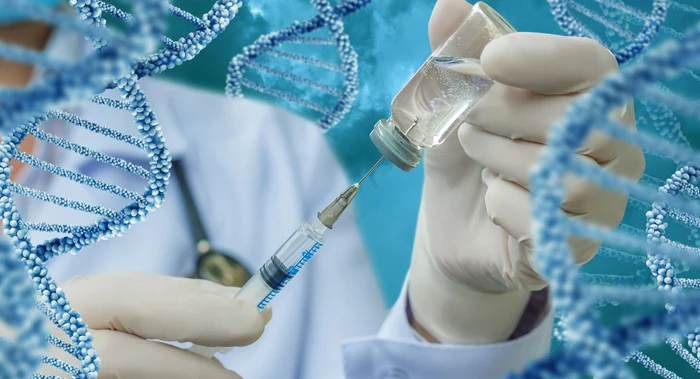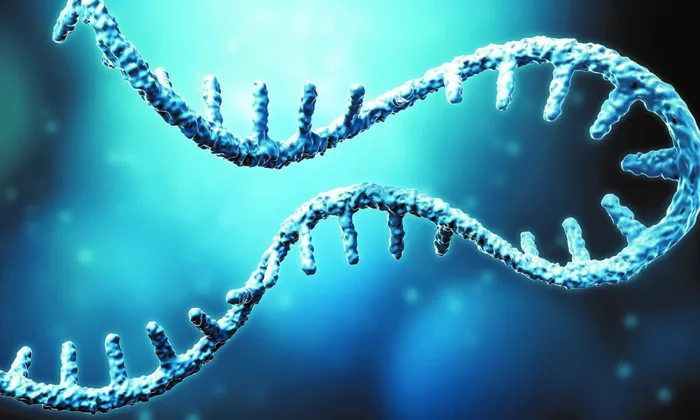DNA vaccines are like tiny instruction manuals that teach our bodies how to fight off diseases. Instead of using traditional methods, these vaccines use simple DNA rings to carry the instructions for making antigens, which are the parts of germs that trigger our immune system to defend us.
Imagine these DNA rings as little packages that contain the information needed to build our body's defenses. When we get vaccinated with a DNA vaccine, our cells receive these packages and start following the instructions inside. This helps our body recognize and fight off the germs if we ever come into contact with them.
One cool thing about DNA vaccines is that they can be given in different ways, like through a shot in the muscle, under the skin, in the nose, or even on the skin itself. This flexibility makes them really versatile.
These vaccines have shown a lot of promise in animals for preventing or treating diseases caused by germs, cancers, autoimmune disorders, and allergies. They're particularly exciting for fighting off tricky intracellular parasites like T. gondii, which can cause infections in animals and humans.
For example, scientists have been testing DNA vaccines against T. gondii by creating special DNA rings that carry the instructions for making proteins that can fight the parasite. These vaccines have been shown to trigger strong immune responses in animals, which could help protect them from getting sick.
Overall, DNA vaccines offer a new and exciting way to help our bodies defend against diseases. With more research and development, they could become powerful tools in our fight against infections and other health challenges.

When creating a DNA vaccine, there are several important things to consider. These include choosing the right antigens, selecting the best delivery method, deciding on the dose and timing, and using adjuvants to boost the immune response. Each of these factors plays a role in determining how well the vaccine will work.
Choosing the right antigens is the first step in designing a DNA vaccine. You need to select the genes from the pathogen that will trigger an immune response. This could be genes that are mutated or wild type, or ones that are found inside the cell, on the cell membrane, or secreted by the pathogen.
The vector used to deliver the antigen can also impact the vaccine's effectiveness. Factors like promoters, enhancers, and introns can affect how much antigen is produced. Most DNA vaccines use plasmids with promoters that produce high levels of protein in mammalian tissues. Making modifications to these vectors, like optimizing the codons, can increase protein production in the cells that receive the vaccine.
For a DNA vaccine to be successful, it needs to contain DNA that codes for the right antigen to trigger the desired immune response. The method of delivery can also affect how well the vaccine works. DNA vaccines can be delivered through injections with needles or using biolistic technology like the Gene Gun or Biojector 2000, which have high efficiency rates.
DNA vaccines have shown promise in protecting animals from various diseases like influenza and rabies. Now, researchers are testing them on humans for diseases like malaria, AIDS, influenza, Ebola, and herpesvirus. These vaccines work by using a small piece of DNA to stimulate the immune system, helping the body recognize and fight off the targeted disease. Ongoing studies are exploring their effectiveness in combating different illnesses.
Cancer poses a significant global health challenge, with many forms remaining untreatable by traditional methods. To improve outcomes for patients with advanced cancer, innovative immunotherapies are needed, and DNA vaccines offer a promising solution. These vaccines harness the body's immune system to target cancer cells specifically, offering safety, stability, and ease of production.
One key advantage of DNA vaccines is their ability to express tumor-specific antigens over an extended period, surpassing the capabilities of RNA or protein-based vaccines. This sustained expression enhances their effectiveness in stimulating immune responses against cancer cells.
In the fight against cervical carcinoma (CC), a particularly prevalent cancer among women globally, DNA vaccines have emerged as a vital tool. CC is primarily caused by persistent infection with human papillomaviruses (HPV), with HPV type 16 being a common culprit. The viral E6 and E7 oncoproteins present viable targets for therapeutic vaccination against CC, and DNA vaccines targeting HPV type 16 have shown promising results in this regard.
DNA vaccines against tuberculosis offer a promising approach in the fight against this widespread disease. Tuberculosis, or TB, remains a significant global health concern, driven by the body's immune response to the bacteria Mycobacterium tuberculosis.
Researchers are exploring therapeutic DNA vaccines as a potential solution. These vaccines involve the use of genetic material to stimulate the immune system's response. In studies, DNA vaccines containing genes for interleukin-2 (IL-2) and the HSP65 fusion protein showed increased effectiveness in mice. By enhancing the body's Th1-type immune response, these vaccines demonstrated improved protection against TB.
Other strategies involve incorporating immunostimulatory elements into DNA vaccines to further enhance immune responses. Recent research has shown promising results with the addition of T-bet, a protein that promotes Th1 immune responses, as an adjuvant in DNA vaccines targeting TB antigens like Ag85B.
Furthermore, scientists have developed innovative DNA vaccines using a backbone derived from the HIV-1 p24 protein. These vaccines not only provide protection against Mycobacterium tuberculosis but also elicit both humoral and cellular immune responses against HIV-1.
Overall, DNA vaccines hold great potential in the fight against tuberculosis, offering new avenues for improved protection and treatment.

DNA Vaccines: A Hopeful Approach to Combat HIV
Human immunodeficiency virus (HIV) is a serious global health threat, leading to acquired immunodeficiency syndrome (AIDS). Sadly, there's still no vaccine to prevent HIV infection. However, researchers are exploring DNA vaccines as a potential solution. These vaccines are in the experimental phase, but they show promise.
In studies, HIV-negative inpiduals have been used to test these vaccines' ability to prevent infection. DNA vaccines offer several advantages, including safety, stability, and the ability for repeated doses. This makes them a key contender for developing an effective HIV-1 vaccine.
Scientists are enhancing the immunogenicity of DNA vaccines for HIV through various methods. They're improving the DNA vector itself and including molecular adjuvants to boost immune responses. Additionally, they're using heterologous prime-boost strategies and delivering vaccines with electroporation.
Electroporation is a technique that uses a small electric field to increase the uptake of DNA vaccines by cells. By temporarily destabilizing cell membranes, it enhances the efficiency of vaccine delivery in the body.
Moreover, nanoparticles are being explored as drug-delivery systems. These tiny particles hold promise for combining protein- and DNA-based vaccines or antiretrovirals. This approach could streamline production, preclinical evaluation, and clinical testing of HIV vaccines in the future.
Overall, DNA vaccines offer hope in the fight against HIV/AIDS, and ongoing research continues to push the boundaries of vaccine development.
Conclusion
In conclusion, DNA vaccines represent a promising frontier in immunology and vaccine development. Their safety, stability, and ability to induce robust immune responses make them valuable tools in combating a wide range of diseases, including viral infections, cancer, and bacterial diseases. The versatility of DNA vaccines allows for the targeting of specific antigens and the customization of immune responses.
While challenges remain, such as optimizing delivery methods and enhancing immunogenicity, ongoing research and technological advancements continue to drive progress in the field of DNA vaccines. As our understanding of the immune system and genetic engineering deepens, we can expect DNA vaccines to play an increasingly vital role in disease prevention and treatment.
With further investment in research and development, DNA vaccines hold the potential to revolutionize the way we prevent and control infectious diseases, ultimately improving global health outcomes and saving lives.
FAQ's
Q. What are the advantages of DNA vaccines?
DNA vaccines offer several advantages over traditional vaccine approaches, including:
Safety: DNA vaccines do not contain live pathogens, making them safer than vaccines based on attenuated or inactivated viruses or bacteria.
Stability: DNA vaccines are highly stable and can be stored at room temperature for extended periods, eliminating the need for cold chain storage and transportation.
Ease of production: DNA vaccines can be produced using recombinant DNA technology, which is relatively simple and scalable compared to traditional vaccine manufacturing methods.
Customizability: DNA vaccines can be engineered to target specific antigens or epitopes, allowing for the development of tailored vaccines against a wide range of pathogens.
Q. Are DNA vaccines currently used in humans?
While DNA vaccines have shown promise in preclinical and clinical studies, only a few have been approved for human use as of now. The COVID-19 pandemic has brought renewed interest in DNA vaccine technology, leading to the development and emergency use authorization of DNA-based COVID-19 vaccines in some countries. Ongoing research continues to explore the potential of DNA vaccines for preventing other infectious diseases and combating cancer and autoimmune disorders.
Q. What are some challenges associated with DNA vaccines?
Challenges associated with DNA vaccines include:
Immunogenicity: DNA vaccines may elicit weaker immune responses compared to other vaccine platforms, necessitating the use of adjuvants or delivery systems to enhance immunogenicity.
Delivery methods: Delivering DNA vaccines to target cells efficiently remains a challenge, as DNA molecules are large and negatively charged, making them difficult to penetrate cell membranes.
Regulatory considerations: Regulatory agencies may require additional safety and efficacy data for DNA vaccines due to their novel nature and potential long-term effects on gene expression and immune responses.
Public acceptance: Public acceptance of DNA vaccines may vary due to concerns about genetic manipulation and unfamiliarity with the technology, highlighting the importance of education and communication in promoting vaccine uptake.